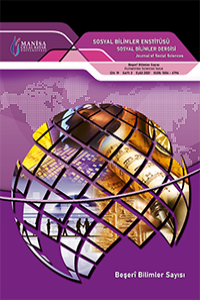Öz
Human beings are the only creatures that "evaluate their actions within a certain meaning, select them and take responsibility for what they encounter as a result. However, in an unequal system where the strong rule over the weak, individuals become dependent, obedient and to be pasture individuals over time. In this context, the factor that brought together Bertolt Brecht and Sait Faik Abasıyanık, who lived in different nations in the same period, at a common point; their belief that every problem encountered at the level of individual and society can be solved by taking the mind as a guide and assimilating the critical view. In this study, written in two different geographies, in two different languages; Sait Faik's short story Sinagrite Father and Bertolt Brecht's short story If Sharks Were Human were handled with hermeneutic method. Purpose; to explain the critical attitude of both authors towards the system and society with a comparative understanding. As a result of the study, it has been observed that in the short stories that both authors deal with an allegorical narrative, they bring a universal criticism towards the oppositions such as strong/weak, oppressor/oppressed, active/passive degeneration of human beings and the existing system that causes it.
Anahtar Kelimeler
Kaynakça
- Abasıyanık, S. F. (2015). Mahalle Kahvesi. İstanbul: Türkiye İş Bankası Kültür Yayınları.
- Alangu, T. (1965). Cumhuriyetten Sonra Hikaye ve Roman 1930-1940 / Cilt:2. İstanbul: İstanbul Matbaası.
- Aytaç, G. (1999). Genel Edebiyat Bilimi. İstanbul: Papirüs Yayınları.
- Benjamin, W. (2011). Brecht’i Anlamak. (Çev. Haluk Barışcan, Güven Işısağ). İstanbul: Metis Yayınları.
- Brecht, B. (1987). Bay Keuner’in Öyküleri. (Çev. Anna-Murat Çelikel). İstanbul: Bulut Yayınevi.
- Doğan, Â. (2009). Türk Tiyatrosunda Brecht Etkisi, Turkish Studies International Periodical For the Languages, Literature and History of Turkish or Turkic Volume 4 /1-I
- Eagleton, T. (2014). Edebiyat Kuramı. (Çev. Tuncay Birkan). İstanbul: Ayrıntı Yayınları.
- Gülsoy-Murat, Sait Faik Nasıl Yazıyor, Erişim adresi: https://muratgulsoy.wordpress.com/2014/06/04/sait-faik-nasil-yaziyor/ Erişim Tarihi: 29.04.2021
- Korkmaz, R., Deveci, M. (2017). Türk Edebiyatında Yeni Bir Tür: Küçürek Öykü. Ankara: Akçağ Yayınları.
- Kula, O. B. (2014). Brecht, Lukacs, Bloch Sanat ve Edebiyat. İstanbul: Türkiye İş Bankası Kültür Yayınları.
- Naci, F. (1998). Sait Faik’in Hikâyeciliği. İstanbul: Adam Yayınları.
- Nutku, Ö. (1985). Dünya Tiyatrosu Tarihi Cilt 2. İstanbul: Remzi Kitabevi.
- Şefik, C. (1994). Klasik Yunan Mitolojisi. İstanbul: İnkılâp Kitabevi.
- Timuçin, A. (2013). Sait Faik’in Dünyası. İstanbul: Bulut Yayınları.
- Yivli, O. (2019). Öykü Nasıl Okunur: Modern Öykü ve Yöntem, Günce Yayınları: İzmir.
“Sinağrit Baba” ve “Köpek Balıkları İnsan Olsaydı” İsimli Kısa Öykülerde Sistem ve Toplum Eleştirisi
Öz
İnsan, “eylemlerini belirli bir anlam çerçevesinde değerlendiren, bunları seçip neticesinde karşılaştıklarının sorumluluğunu alabilen” tek varlıktır. Fakat güçlünün zayıf olana hükmettiği, eşitliksiz bir sistem içerisinde, zamanla bağımlılaşan, itaatkâr ve güdülen bireyler meydana gelmektedir. Bu bağlamda aynı dönemde, farklı uluslarda yaşamış olan Bertolt Brecht ve Sait Faik Abasıyanık’ı ortak bir noktada buluşturan etmen; birey ve toplum düzleminde karşılaşılan her sorunun aklı rehber edinerek, eleştirel bakışı özümseyerek çözümlenebileceğine olan inançlarıdır. Bu çalışmamızda iki farklı coğrafyada, iki farklı dilde kaleme alınan; Abasıyanık’ın Sinağrit Baba isimli kısa öyküsü ile Brecht’in Köpek Balıkları İnsan Olsaydı isimli kısa öyküsü hermeneutik yöntem ile incelenmiştir. Amaç; her iki yazarın da sisteme ve topluma yönelik eleştirel tutumunu karşılaştırmalı bir anlayış ile açıklamaktır. Yapılan çalışma sonucunda her iki yazarın da alegorik bir anlatım ile ele aldıkları kısa öykülerde, güçlü/zayıf, ezen/ezilen, etken/edilgen gibi karşıtlıklara, insanın yozlaşmasına ve buna neden olan mevcut sisteme yönelik evrensel bir eleştiri getirdiği gözlemlenmiştir.
Anahtar Kelimeler
Kaynakça
- Abasıyanık, S. F. (2015). Mahalle Kahvesi. İstanbul: Türkiye İş Bankası Kültür Yayınları.
- Alangu, T. (1965). Cumhuriyetten Sonra Hikaye ve Roman 1930-1940 / Cilt:2. İstanbul: İstanbul Matbaası.
- Aytaç, G. (1999). Genel Edebiyat Bilimi. İstanbul: Papirüs Yayınları.
- Benjamin, W. (2011). Brecht’i Anlamak. (Çev. Haluk Barışcan, Güven Işısağ). İstanbul: Metis Yayınları.
- Brecht, B. (1987). Bay Keuner’in Öyküleri. (Çev. Anna-Murat Çelikel). İstanbul: Bulut Yayınevi.
- Doğan, Â. (2009). Türk Tiyatrosunda Brecht Etkisi, Turkish Studies International Periodical For the Languages, Literature and History of Turkish or Turkic Volume 4 /1-I
- Eagleton, T. (2014). Edebiyat Kuramı. (Çev. Tuncay Birkan). İstanbul: Ayrıntı Yayınları.
- Gülsoy-Murat, Sait Faik Nasıl Yazıyor, Erişim adresi: https://muratgulsoy.wordpress.com/2014/06/04/sait-faik-nasil-yaziyor/ Erişim Tarihi: 29.04.2021
- Korkmaz, R., Deveci, M. (2017). Türk Edebiyatında Yeni Bir Tür: Küçürek Öykü. Ankara: Akçağ Yayınları.
- Kula, O. B. (2014). Brecht, Lukacs, Bloch Sanat ve Edebiyat. İstanbul: Türkiye İş Bankası Kültür Yayınları.
- Naci, F. (1998). Sait Faik’in Hikâyeciliği. İstanbul: Adam Yayınları.
- Nutku, Ö. (1985). Dünya Tiyatrosu Tarihi Cilt 2. İstanbul: Remzi Kitabevi.
- Şefik, C. (1994). Klasik Yunan Mitolojisi. İstanbul: İnkılâp Kitabevi.
- Timuçin, A. (2013). Sait Faik’in Dünyası. İstanbul: Bulut Yayınları.
- Yivli, O. (2019). Öykü Nasıl Okunur: Modern Öykü ve Yöntem, Günce Yayınları: İzmir.
Ayrıntılar
| Birincil Dil | Türkçe |
|---|---|
| Bölüm | Beşeri Bilimler Sayısı |
| Yazarlar | |
| Yayımlanma Tarihi | 24 Eylül 2021 |
| Yayımlandığı Sayı | Yıl 2021 Cilt: 19 Sayı: 3 |


